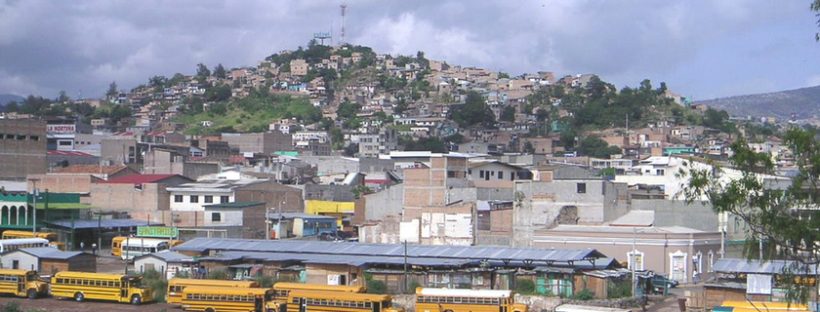
Adalia couldn’t find a lot about Honduras online before she moved there. But she was game for an adventure, and she had a teaching offer at a small international school there. Less than a year in, she’s planning her next move.
What’s your travel story?
I moved Tegucigalpa, Honduras in July on a two-year contract. I’ve been teaching for about 19 years, but here I have a non-teaching position as an instructional technologist, assisting teachers and students with integrating technology into the classroom.
As it turns out, the school is not in a great financial situation. They’re restructuring for the next school year, and not renewing the contracts of some of the teachers. They told me that I’d have to teach at least three classes next year in addition to doing my current job. It was also clear that they likely wouldn’t have funds to pay me beyond the initial two year contract. I asked them if there was any possibility of my not teaching, but it was not, so decided that I’ll be leaving at the end of the school year.
Initially, my daughter had no interest in living abroad. But she decided to come for a year. She enjoyed herself so much here that she was thinking she’d maybe stay for 2 years. But as it turns out, it’s academically much better for her to finish high school in the States. That made my decision to leave easier.
How did you decide to come to Honduras?
Going abroad was something I wanted to do my whole life. But I got married when I was 19 and had two kids. Going abroad was not my husband’s thing. I got divorced about two-and-a-half years ago. My youngest just turned 16.
I told myself I’d go abroad when my daughter graduated from high school. But last year I was in the classroom and I just found myself thinking, “I’m done.” I wasn’t sure if it was American schools, high school, or just teaching in general. This job in Honduras was an experiment to see what exactly it was I was done with.
I knew I wanted to learn another language. After trips to Thailand, China and Egypt, I decided I needed to learn a language where at least the alphabet was the same as English! So I shifted my search to Latin America.
I’d never been to Honduras before. Not that many people come here. Some people consider it a hardship post. But I thought, “It’s the capital, there’s got to be stuff to do….”
What are some of the challenges of living in Tegucigalpa?
People don’t typically hang out after dark because it’s really not that safe. All of the houses and stores are behind a wall or a gate; there aren’t really sidewalks. If you really want to hold onto your phone you don’t want to use it on the street. You just have to know how to carry yourself.
There are no city parks. I’m guessing that’s because there’s no money; and this is not a place where people hang out together outside much. We don’t have anything at school after dark. The school is having a concert this semester. The administration was very concerned about releasing the details of the event because of safety concerns.
There’s no mail service! When I set up my bank account, someone from the bank came to the school and brought me my ATM card. Because they couldn’t just send it to me!
Also, there are no addresses. I’m lucky that I live near a very well known landmark, because even taxi drivers don’t recognize the name of my neighborhood. If there are house numbers, they’re not in order. One house might be #33 and it might be next door to #2412. Some of the streets have names but nobody knows what they are. You can’t rely on Google maps here. Most businesses don’t have independent websites; they might have a Facebook page.
I’m from Houston originally, where there are tons of museums, concerts, so much going on. But in the capital of Honduras, there’s really not much to do. There’s one museum. You can go to the mall. That’s pretty much it.
What are some of the things you like best about being there?
My expectations with the standard of living were in line with reality. I knew it wouldn’t be able to drink the water, that kind of thing. Actually, the apartment they found me is way nicer than I expected. And the people have been incredibly nice.
I like some of the odd things. For the equivalent of 8 cents, you can buy water in a bag; it’s hilarious to me. Also, the rapidito buses are not centrally organized; each driver is independent contractor. So they pimp out their buses and blast reggaeton to attract more customers. ’80s music has gone to die in Honduras. It’s nonstop MTV hits from the 80s!
Overall, the food is not great; it’s typically overcooked. The signature dish is baleada, a thick flour tortilla with beans, eggs, fried plantains and crema. But fried chicken is everywhere! On a given street corner, you’ll see three or four different fried chicken places.
Have you traveled much since you’ve been there?
Honduras is a really inconvenient place to be. It’s expensive to travel, even to other places in Latin America. There are no direct flights of from Honduras to Mexico City. Even flights to Panama are prohibitively expensive. Because of that, I knew that it wasn’t going to work long term.
The beaches are beautiful. But it’s not easy to get to them. We flew to Roatan for Thanksgiving. I purposely didn’t stay on the west side of the island, which is where the cruises go. We stayed far on the east side in a very small place, known for kite surfing. A population of Garifuna live on that part of the island. We stayed right on the beach, heard the crashing of the waves. It felt a lot safer there; people were still walking around after dark.
We took a bus to Tela, on the northern Caribbean coast. The Hondurans I work with told me that was kind of a dangerous idea because sometimes buses are targeted. A coworker told me not to put my bag underneath the bus, just in case someone stops the bus and sets it on fire! Also, you can’t travel at night from one city to another. I don’t think there are any lights on the highway; the roads are bad, and there are narcos or gangs on the highways. It’s just not safe.
What’s your social life like now?
One of my coworkers (who’s 10 years younger than I am) has met the love of her life here! Another coworker is half-Honduran; she speaks Spanish and does muay thai and hangs out a lot with the people from her gym. But for me, it’s been very difficult socially.
I’m not going to hang out in the hostel bar. I’m not going out drinking and dancing; I did that once here and it was a bit of a disaster. The only guy who asked me to dance was maybe 60-something, and he didn’t speak any English. Most of the Hondurans and even the embassy and military guys are married. I just don’t think there are a lot of single men here.
But I’m an introvert, so it may just be me. Most of my fun involves doing stuff around the house. I sew, go to the movies, go out to eat. We get a long weekend every month, so almost every month we’ve traveled either within Honduras or beyond.
What’s next for you?
Honduras is surprisingly expensive. I couldn’t hang out here and live off of my savings, even if I’d wanted to stay. Now that I’ve decided I’m leaving Honduras, I’m in a position to do whatever I want!
Being here helped me clarify my must-haves: The next place I live needs to have a hub airport so I can easily go other places from there. It needs to be a large, relatively cheap city. And I don’t want to own a car.
I went to a site called The Earth Awaits, which lets you compare places based on cost of rent, safety, internet speed, whatever your non-negotiables are. I narrowed my choices down to Lisbon, Mexico City and Medellin. Over Christmas, I spent some time in Lisbon. I really enjoyed it, but the little Spanish I have didn’t help me.
I’m going to visit Mexico City in June. I’ve been to Progresso, Cancun, Guadalajara before, but not Mexico City. I’m concerned that the capital might be too big. So that’s going to be the recon trip that I didn’t take when I moved to Honduras. My daughter also is also happy for me to be there because I’ll be closer to Houston.
I’m not looking for another teaching job. After I travel this summer, I’ll enroll in an intensive Spanish course. And hopefully with my down time I’ll figure out some way to support myself before the money runs out. My daughter will be back in the States, but I’ll have my dog with me.
Advice to single women who are considering moving abroad?
If you’re bringing a kid, you have to think about schools. My school paid for my daughter’s tuition. In Latin America, you don’t make a lot of money, so that was really important. There are some places where you can let your child go to the public schools; this would not be the place.
My general advice: Go for it. It can be done. It’s not a difficult thing to do. I never had the thought of, “Can I do this?” It was more like, “How am I going to do this?”
Where you can find her
Instagram: @pickygirltravels
PickyGirlTravelstheWorld.com
